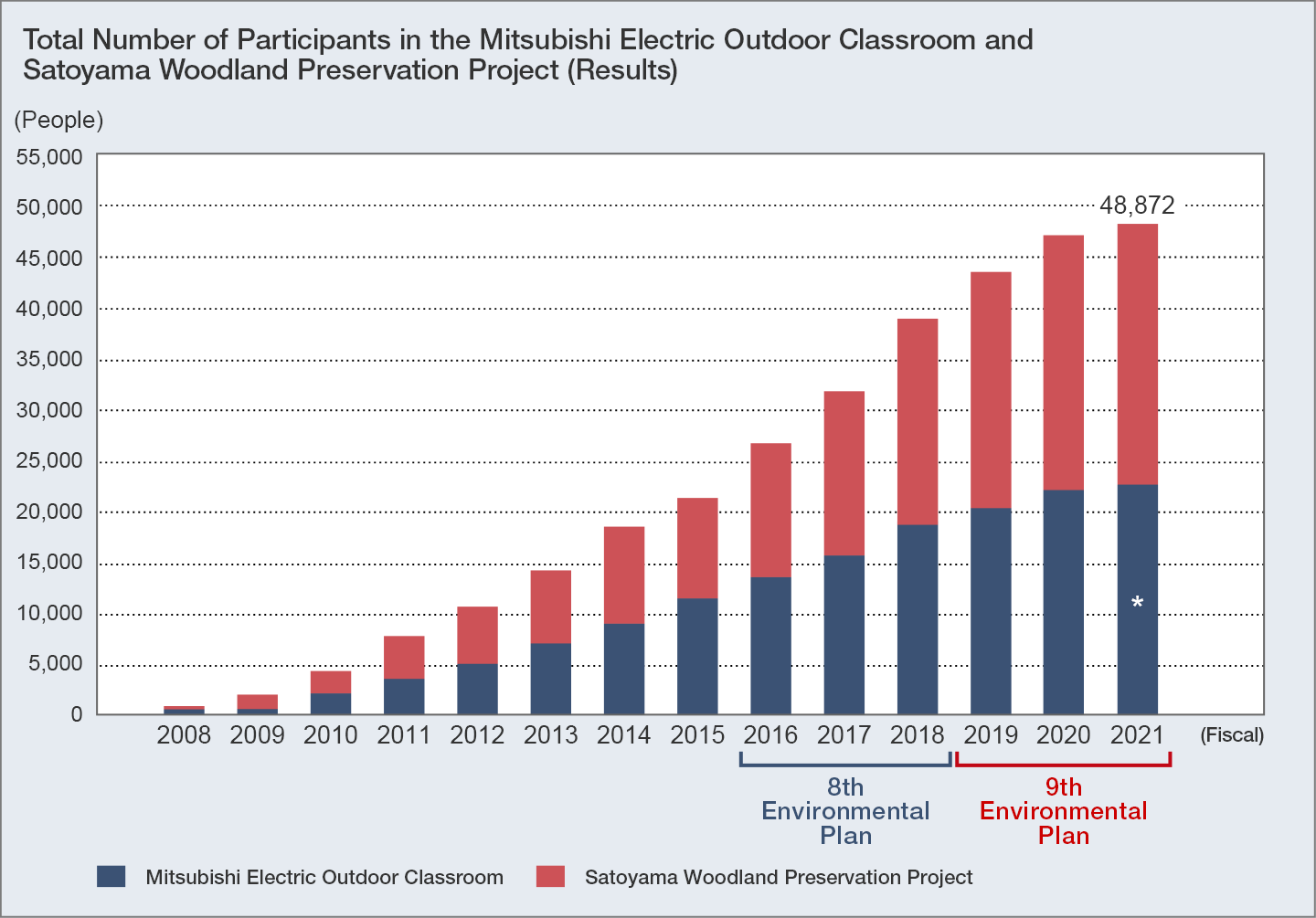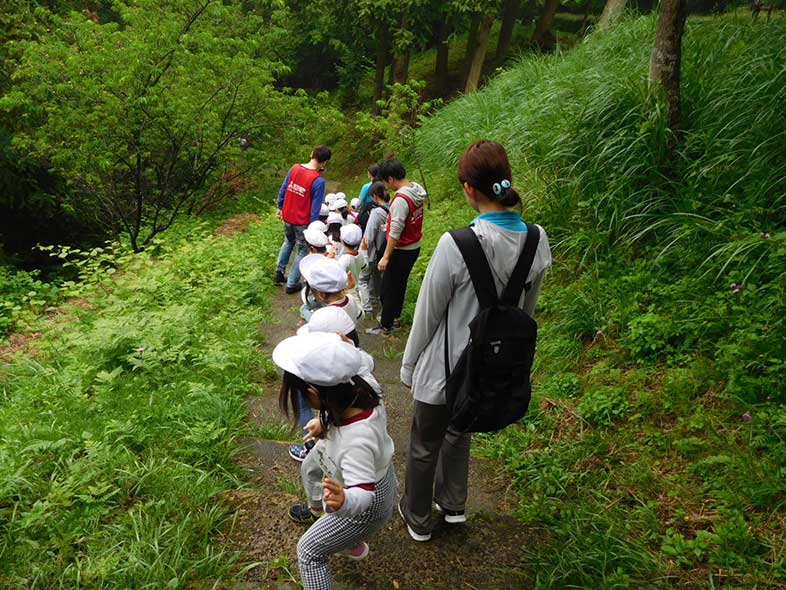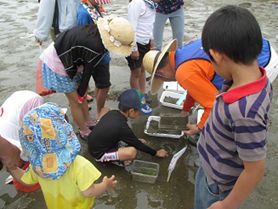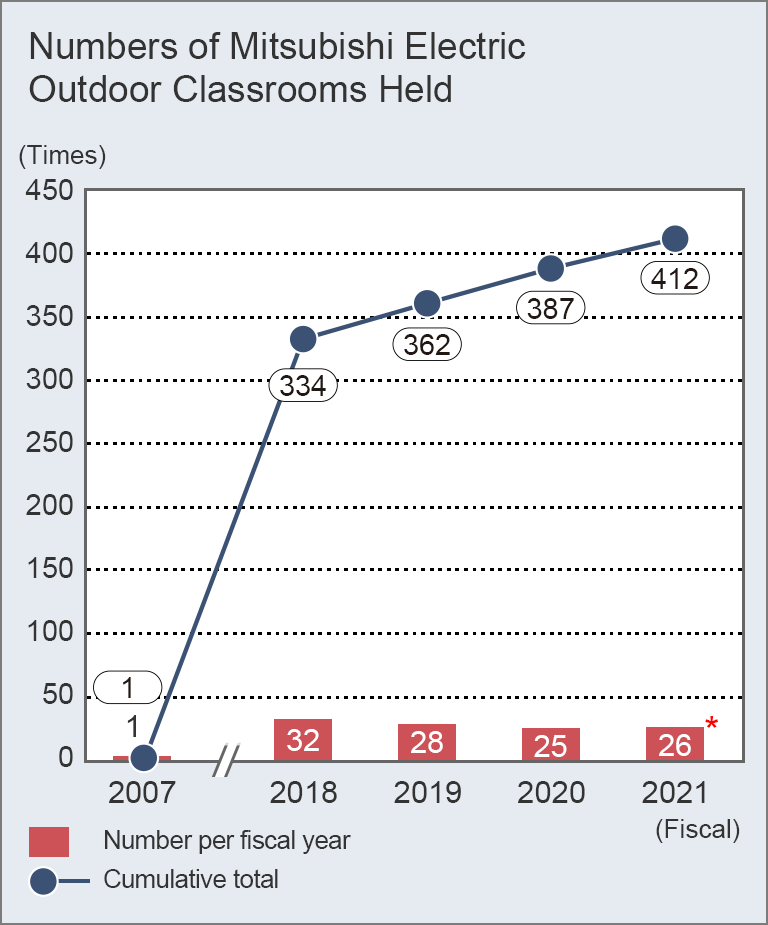Japan
Mitsubishi Electric Outdoor Classroom
Mitsubishi Electric Outdoor Classroom
Mitsubishi Electric Outdoor Classroom is one of the directives of "fostering environmental awareness" aimed at the realization of a society in tune with nature. These classrooms utilize nearby natural habitats and provide an opportunity for participants and classroom leaders alike to experience nature.
Contemplating the Necessity of Preserving Nature and Taking Action
The Mitsubishi Electric Group is developing personnel who contemplate what is necessary to preserve nature and then take action themselves; in other words, people who are environmentally aware. We want participants to get in touch with nature so that they can realize the impact humans have on nature, increase their awareness of the importance of preserving nature, and take action to reduce their environmental load as much as possible (the figure below). Biodiversity is essential to the continuation of our business activities. On the other hand, our activities—such as consuming various resources, discharging chemical substances, and producing waste—place a burden on ecological systems on a daily basis. We must be aware of this and contribute to reducing the negative impact on the water, air, and soil, in addition to reducing our environmental load and helping to improve the environment through our products.
The foundations of environmental awareness are strengthened deeply and strongly through "fully experiencing nature with the five senses." The Outdoor Classroom is our initiative to allow ourselves, together with our employees, their families, and local communities, to discover ecology (relationships among living creatures) through experiencing nature. Preserving nature cannot be achieved by the Mitsubishi Electric Group alone. Therefore, it is vital that environmental awareness is spread to various groups of people. Since the program began in October 2006, the Outdoor Classroom has been playing a role as an opportunity for contributing to society and the environment, and has acted as a forum for communication within each region.

Illustration prepared while referring to a pamphlet introducing the Japan Association for the Promotion of Outdoor Life
Features of the Mitsubishi Electric Outdoor Classroom
Employees Responsible for Planning and Managing Programs
In the running of Mitsubishi Electric Outdoor Classrooms, a lot of emphasis is placed on the employees "doing it for themselves." The programs are planned by Group employees who have completed an Outdoor Classroom Leader Development Course, who serve as "Outdoor Classroom leaders." The choice of fields, the ways in which nature is experienced, and the timing (season) of the classrooms are all at the discretion of these leaders. The leaders utilize the emotional experiences and discoveries gained through their development course and compile a program of their choice utilizing their own creativity. Mitsubishi Electric also involves the cooperation of local key persons, NPOs, and so on to ensure that our outdoor classrooms leave an even deeper impression on the participants. There are as many variations of the Outdoor Classroom as there are leaders.
Turning Fields Near Business Sites Into "Classrooms"
Outdoor classrooms are held in various locations, including mountains, forests, parks, seashores, rivers, rice fields and farms. The outdoor classroom leaders throughout Japan make the neighboring natural habitat their classroom. Occasionally, they may also use the grounds of the business site itself as a classroom. Each location has its own unique fauna, flora, sounds, and smells. Mitsubishi Electric Outdoor Classrooms provide an opportunity for children and adults alike to experience the workings of nature and make various discoveries through their own five senses.
Objectives of the 9th Environmental Plan (Fiscal 2019‒2021) and Results of Fiscal 2021
With the 9th Environmental Plan (fiscal 2019‒2021), our objective was to continue the "Mitsubishi Electric Outdoor Classrooms" and "Satoyama Woodland Preservation Project," aiming to surpass the 51,000 mark in total participants by the end of fiscal 2021 by achieving an increase of 12,000 participants from March 2018. With 4,070 people taking part in fiscal 2020, the total number of participants to date has reached 47,808.
- * Includes the number of times the "Biodiversity Observation by One Million People" program was held.

- * Includes the number of times the "Biodiversity Observation by One Million People" program was held.
Features of the Mitsubishi Electric Outdoor Classroom
Learn about Nature's Cycle
-

Even after trees have withered, the "cycle of life" continues. Fallen leaves and deadwood provide habitats and food for insects, while being steadily decomposed by fungus. Sustaining a large amount of "life" in this way, trees eventually return to the earth over a long period.
-

Seeds fall into fertile soil and sprout, leading to the start of new "life."
-

Grown trees bear seeds and nuts, providing food for other living organisms, and eventually die and decompose.
-

Trees thrive in abundant sunshine, developing into a forest, where many animals gather.
Experiencing Nature with Full Use of the Five Senses

-

Kyushu Branch Office
Every year, nature experiences are shared with the children of Futaba Nursery School in Aburayama Shimin no Mori/Natural Observation Woods (Fukuoka Prefecture). The fiscal 2019 Outdoor Classroom session was conducted just after a rainfall, using a trail in the forest as an observation field. Coming across Japanese freshwater crabs and frogs that were bigger than normally seen particularly excited the nursery school children. Extra attention was paid to ensure the safety of all children, including walking crab-fashion when coming across slippery parts of the path that were overgrown with moss.
-

Kobe Area (Kobe Works, Energy Systems Center)
An annual sea creature hunt--looking for shrimp, gobies, and hermit crabs—was held in conjunction with a clam digging event on Shinmaiko Beach (Hyogo Prefecture). The highlight of fiscal 2019 activities was the "No. 1 Creature" contest. All creatures found by the children were given top honors according to their respective merits, such as size, vivid colors, and cuteness. The Outdoor Classroom session provided hands-on experience in biodiversity while also nurturing the children’s self-esteem.
"Eco Changes" in My Thinking and Behavior Triggered by Participating in the Outdoor Classroom Program
As a Parent and Citizen, I Started Thinking about What I Can Do for the Environment Outside My Job

"So many creatures are living here!" That was my surprise through aquatic life observation at the Ashiya River in Hyogo Prefecture. In the event I took part in with my children, I also found myself a child again, totally absorbed in finding wildlife. Species like those on the Red List are unfamiliar to many of us. But when I saw so many and such a diversity of living things, I understood that rare species are also maintained in the chain of life.
In the following year, we joined an Outdoor Classroom session that took place at Sanuki Hiroshima in Kagawa Prefecture. As part of the program, we collected plastic waste, the amount of which stunned me. According to my findings, waste as much as half the volume of Tokyo Dome is washed ashore throughout Japan every year. This means that it would take 10 million people to each pick up 19 kilograms of rubbish. The Outdoor Classroom Program offers a variety of events that prompt participants to realize and think about many things. I am glad that I took part in it.
I am responsible for the development and design of a device called gas-insulated switchgear. This equipment has a significant impact on the environment. Therefore, I have always been aware of the environment through my job. I am pleased that my children have started to take more interest in nature and the environment since they took part in the Outdoor Classroom Program. Recently, they have been passionate about fishing and seem to be interested in tidal cycles as well, saying "It’s a spring tide today, so we’ll have a good chance of a good catch." When they visited a planetarium for the first time, they were impressed with the clear night sky filled with stars. In the future, I want to go camping with my children so we can come in closer contact with nature together. I hope the Outdoor Classroom activities will develop my children’s interest in the environment and encourage them to think about what we could do to motivate people, for example, in addressing waste issues.
Takao Tsurimoto
C-GIS Section, Power Distribution Systems Division
Power Distribution Systems Center
Children’s Interest in Ecosystems Inspired from Their Love for Insects

My entire family is passionate about nature and insects, and my children study about insects on the Internet whenver they find one. Their online research begins with a simple question like, "What kind of insect is that?" As they look into their question, one intriguing piece of information leads to another. That’s how their knowledge develops. Watching my children learning in that way, I have been hoping to increase their opportunities to actually observe and interact with more creatures in nature. That was the reason I joined the Outdoor Classroom Program with my children.
Nothing beats a real experience. My children have changed significantly since they took part in the Outdoor Classrooms. Up until then, their curiosity was satisfied with merely catching insects, but it has grown to the point where they are now keeping them. One summer vacation, they even chose insects as a subject of their free projects. Their interst in ecology has been growing rapidly through their experience in keeping insects. It is fun to take care of the insects with my children. I am also happy to see them develop their interests even further. I think the Outdoor Classroom Program has the power to change children.
As for myself, participating in the program has spurred me towards the preservation of nature and ecosystems, and has strengthened the sense of need to pass on a rich natural environment to future generations. At home, my wife and I try to switch off electrical appliances as often as possible. I also carefuly select car shampoos that have minimal environmental impact. At work, we are working to improve production technologies based on our belief that improved productivity leads to the conservation of energy and resources.
Osamu Watanabe
Production Technologies Section, Manufacturing Management Division
High Frequency & Optial Device Works
I Shared the Joy of Finding Various Living Creatures with My Children through the "Eureka! Living Creatures" Program

As a parent, and as a consumer, I began to think about what I can do for the environment besides my work.
My children were filled with frustration, as they were unable to go out this year because of the COVID-19 pandemic. It was then that I heard about "Eureka! Living Creatures *." I said, "This is it!" and signed up us.
Each time my children and I found insects and birds that we didn't know the name of, we were surprised to discover them in such unexpected places, and were also excited to see our check sheet gradually getting filled. The children reached the peak of their excitement when we found the "Kumazemi (Cryptotympana facialis)," a kind of cicada regarded as a rare species. Even when we went on a farther trip, we looked for insects from early in the morning, as the children were too excited to sleep any longer. Thanks to their enthusiasm, we were able to see the emergence of a cicada that we have always dreamed of. Through "Eureka! Living Creatures," we found 33 of the 40 species listed on the check sheet and realized that there are surprisingly many living things in our immediate environment. Furthermore, I was able to see how the children have grown, as I watched them try to solve questions that naturally popped into their minds, such as "Why do cicadas sing? Where is the sound coming from? How do you tell a male from a female?," and gently return the insects they caught to where they were found.
I hope my children will take the opportunity of this program to take greater interest in living creatures and learn to hold them dear.
- * Eureka! Living Creatures : A program for parents and children to look for living creatures listed on a check sheet while having fun together, as an alternative to the "Mitsubishi Electric Outdoor Classrooms" which have been canceled due to COVID-19.
Kodai Kurihara
Water Quality Control G, Environmental Systems Engineering Department
Advanced Technology R&D Center

